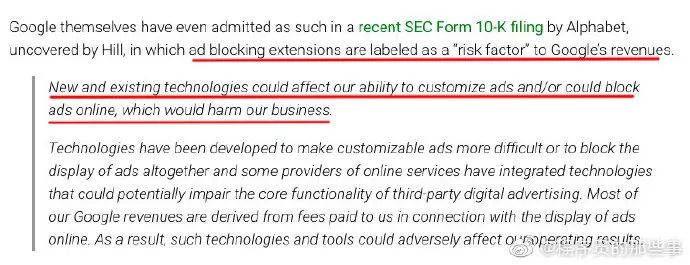Google has been criticised for promising not to weaken Chrome's ad blocking
(Give.)The front line of technologyAdd stars and watch technical hotspots every day)
Synthesis: Technology Frontline (id: TopITNews)
After being slammed by users, Google engineers promised in the Chromium blog that upcoming changes to chrome extensions would not weaken ad blockers. The search giant claims that Chrome's new extended API actually improves user privacy and speed. Google has also promised to increase the limit on new APIs to address the biggest criticism of the new extended API by ad blocker developers.
One of the changes to the controversial extension platform, known as Manifest V3, is the Web Request API used by the Publicity Net Request API instead of the ad-blocking extension, and the biggest criticism of the new API by extension developers is that it sets a hard-coded limit of up to 30k rules per extension. uBlock Origin, on the other, has nearly 200K rules without any region-specific lists. Article 30k is a ridiculous restriction that will significantly reduce the availability of ad blocking extensions.
Google says it plans to increase the limit from 30k to 150k, but the limit is still very low and the community doesn't seem to be buying at all.
A previous informational synth
Previous Chrome ad blocking plug-ins, basically using Chrome's webRequest API, banned ad content until it was loaded.
Google is clearly opposed to this approach. In Google's January 2019 Manifest V3 proposal, major changes were made to the Chrome extension, including changes to the permissions system and fundamental changes to the way ad blockers operate.
Google's approach sparked widespread criticism in the community, and a few months later Google developers responded to several questions from the community, sticking to their original position that Chrome's WebRequest API would still block content that users didn't want, but that it would only be available to paying enterprise users.
The vast majority of Google's revenue comes from advertising. In a recent filing with the Securities and Exchange Commission, Alphabet, Google's parent company, referred to ad blocking plug-ins as a "risk factor" for Google's revenue.

Eben Moglen, a professor of antitrust law at Columbia Law School, says Chrome has become totally hostile to services that try to reduce ad serving, such as ad blockers.
Recommended reading
(Click on the title to jump to read)
Chrome restricts ad extensions, and these browsers don't follow up
Embrace the new Edge after Chromium and be compatible with IE mode
Think this information is helpful? Please forward it to more people
Concern. The front line of technology with stars,Look at IT news

The latest industry news, II'm watching❤️
Go to "Discovery" - "Take a look" browse "Friends are watching"